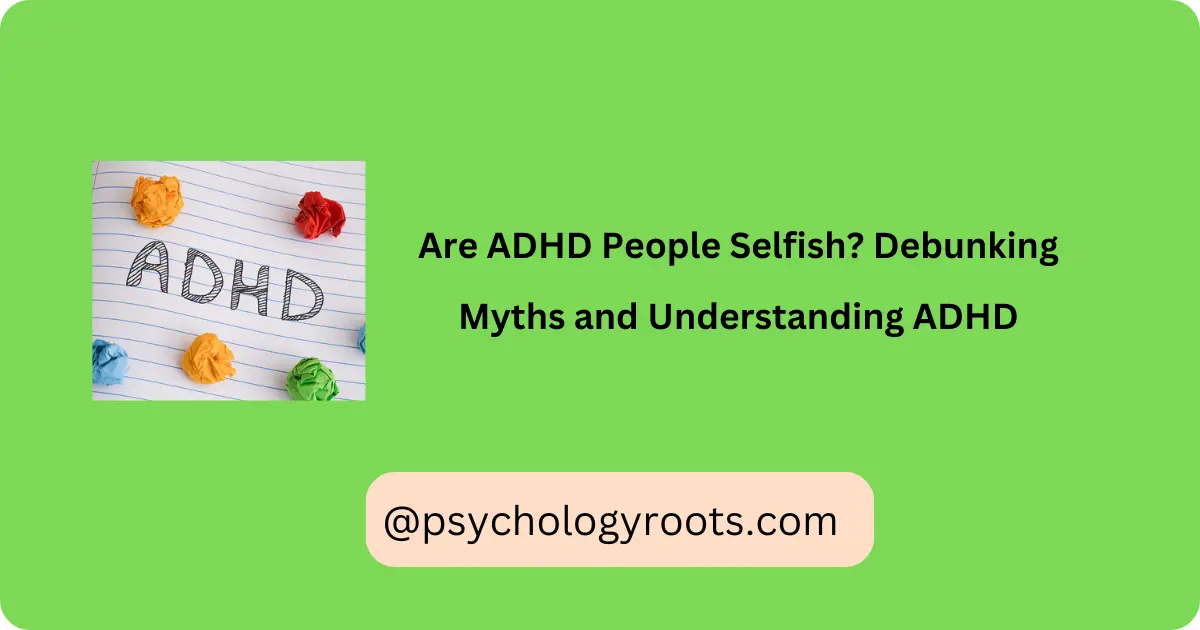Table of Contents
Are ADHD People Selfish? Debunking Myths and Understanding ADHD
Attention-Deficit/Hyperactivity Disorder (ADHD) is one of the most misunderstood neurodevelopmental disorders. People with ADHD are often labeled as selfish, lazy, or disrespectful, but these assumptions stem from a lack of understanding about the condition. ADHD affects brain functioning, influencing focus, impulse control, and behavior in ways that might appear self-centered to others but are rarely intentional.
This blog explores the complexities of ADHD, debunks the myth of selfishness, and provides insights to better understand and support those with this condition.
Understanding ADHD and Misconceptions
What is ADHD?
ADHD is a neurodevelopmental disorder characterized by symptoms of inattention, hyperactivity, and impulsivity. It affects individuals across all ages and can significantly influence daily functioning and relationships.
Common Misconceptions
People with ADHD are often misperceived as:
- Selfish: Their impulsive actions or difficulty in focusing on others may seem self-absorbed.
- Lazy: Struggles with task initiation or organization can be mistaken for a lack of effort.
- Disrespectful: Interrupting conversations or appearing distracted may be seen as rude.
These behaviors are not intentional but stem from the neurological differences caused by ADHD.

Are ADHD People Selfish?
Impulsivity and Misinterpretation
Impulsivity is a core symptom of ADHD. It may lead individuals to interrupt conversations, focus on their own needs, or struggle with social cues, which can be misconstrued as selfishness.
For example, someone with ADHD might unintentionally dominate a discussion because they fear forgetting their point, not because they want to dismiss others.
Difficulty Managing Attention
ADHD affects attention regulation, making it challenging for individuals to stay present in conversations or activities. This inattention may seem like they are uninterested in others, but it’s often a struggle to stay focused rather than a lack of care.
Overwhelm and Emotional Regulation
Many people with ADHD experience emotional overwhelm. When they feel overstimulated or anxious, they may withdraw or focus inward to cope. This protective behavior might appear self-centered but is a response to their neurological challenges.
Why ADHD is Often Misunderstood
- The Organized “Mess”: People with ADHD often have unconventional ways of organizing their lives. What looks like a mess to others might be their unique method of maintaining order. Misunderstanding this can lead to unfair judgments about their capabilities or intentions.
- Fidgeting and Movement: Fidgeting is not a sign of distraction but a scientifically proven way for people with ADHD to enhance focus. Movement helps regulate their nervous system and maintain attention, but it might be seen as inattentive or disruptive by others.
- Struggles with Social Norms: ADHD can make it difficult to adhere to social norms, such as waiting for a turn to speak or maintaining consistent eye contact. These behaviors are not deliberate acts of selfishness but challenges linked to their condition.
How to Support Someone with ADHD
- Educate Yourself: Understanding ADHD is crucial. Learn about its symptoms, triggers, and impacts on daily life to develop empathy.
- Communicate Clearly: Use direct and concise communication. People with ADHD may struggle with indirect cues or lengthy explanations.
- Practice Patience: Avoid interpreting behaviors as intentional offenses. Recognize their challenges and offer support without judgment.
- Encourage Strengths: ADHD individuals often possess creativity, adaptability, and unique problem-solving skills. Celebrate these strengths to boost their confidence.
- Set Boundaries: While supporting someone with ADHD, it’s essential to set healthy boundaries to maintain balanced relationships.
Why It’s Time to Stop the “Selfish” Label
The label of selfishness unfairly stigmatizes those with ADHD. It overlooks their struggles, reinforces negative stereotypes, and hampers their self-esteem. Instead of labeling, we should aim to understand their behavior through the lens of their neurological differences.
People with ADHD often feel deeply and care profoundly but may lack the tools to express it in conventional ways. A shift in perspective can foster compassion and stronger connections.
Frequently Asked Questions (FAQs)
Are ADHD people really selfish?
No, behaviors that appear selfish are often due to symptoms like impulsivity or attention regulation challenges.
Why do people with ADHD interrupt conversations?
Interruptions stem from impulsivity or fear of forgetting their thoughts, not from disrespect or disinterest.
How can I support someone with ADHD?
Educate yourself, communicate clearly, and focus on their strengths while practicing patience.
Is fidgeting in ADHD helpful?
Yes, fidgeting improves focus and helps regulate the nervous system in people with ADHD.
Can ADHD behaviors improve with treatment?
Yes, therapies, medications, and behavioral strategies can significantly enhance coping skills and reduce challenges.
References
- Barkley, R. A. (2014). Attention-Deficit Hyperactivity Disorder: A Handbook for Diagnosis and Treatment. Guilford Press.
- Brown, T. E. (2013). Smart but Stuck: Emotions in Teens and Adults with ADHD. Jossey-Bass.
- Hallowell, E. M., & Ratey, J. J. (2010). Driven to Distraction (Revised): Recognizing and Coping with Attention Deficit Disorder. Anchor Books.
- Centers for Disease Control and Prevention (CDC). (2021). ADHD: Data and Statistics.
- American Psychiatric Association. (2013). Diagnostic and Statistical Manual of Mental Disorders (DSM-5).
Help Us Improve This Article
Have you discovered an inaccuracy? We put out great effort to give accurate and scientifically trustworthy information to our readers. Please notify us if you discover any typographical or grammatical errors.
Make a comment. We acknowledge and appreciate your efforts.
Share With Us
If you have any scale or any material related to psychology kindly share it with us at psychologyroots@gmail.com. We help others on behalf of you.